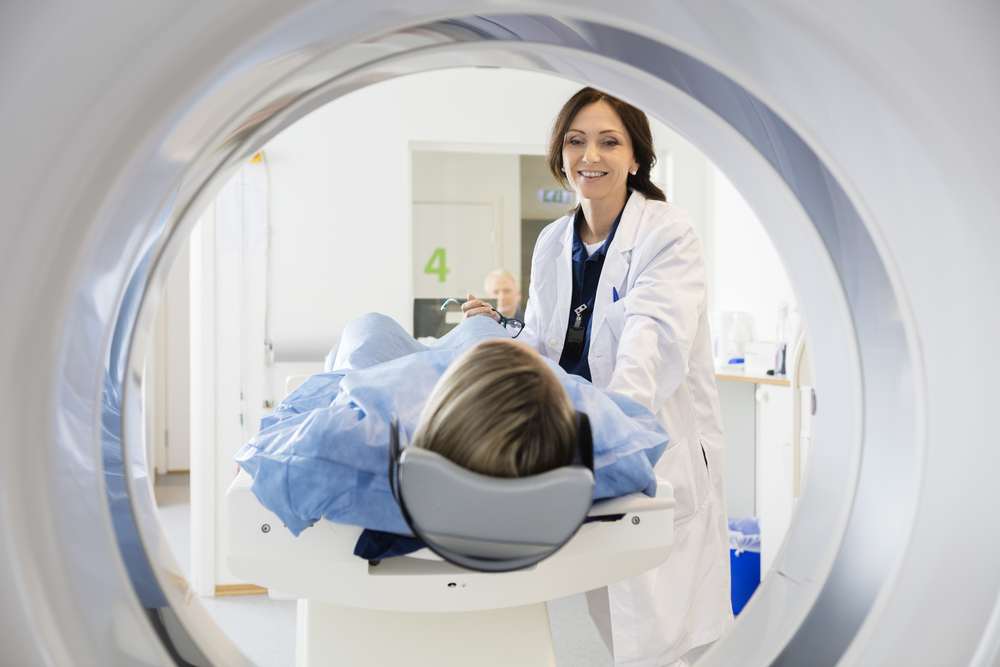 There are a number of reasons why your doctor may request an MRI scan to help diagnose an injury or illness. Magnetic resonance imaging (MRI) is a type of diagnostic imaging scan that takes cross-sectional images of your internal structures and organs. This type of scan uses high-powered magnets and radio waves to produce these highly detailed pictures so your doctor can diagnose the condition, develop a treatment plan, and continue to assess how treatment has been going. MRI scans can be used to examine bones, muscles, organs, and other internal structures throughout the body. There are different types of MRI scans and your doctor may request a certain kind depending on what they are looking for and need to diagnose.
There are a number of reasons why your doctor may request an MRI scan to help diagnose an injury or illness. Magnetic resonance imaging (MRI) is a type of diagnostic imaging scan that takes cross-sectional images of your internal structures and organs. This type of scan uses high-powered magnets and radio waves to produce these highly detailed pictures so your doctor can diagnose the condition, develop a treatment plan, and continue to assess how treatment has been going. MRI scans can be used to examine bones, muscles, organs, and other internal structures throughout the body. There are different types of MRI scans and your doctor may request a certain kind depending on what they are looking for and need to diagnose.
The Traditional MRI Scan
Many people have never had an MRI scan before and may only know about them from another person’s experience or through television. The traditional MRI scan is typically what is depicted in television shows, where someone lies on a table which is then inserted into a large machine shaped like a tube. This is the MRI machine and the magnets and radio waves function inside the donut-like structure. Depending on what part of the body is being scanned, you may be moved into the machine head first or feet first. The machine is known for making rather loud tapping and banging noises, so you will likely be provided with earplugs or headphones to wear during the scan.
Open MRI Scans
While the traditional MRI scan is closed, there are also open MRI scans that allow for an experience that isn’t enclosed, which can be stressful and uncomfortable for people who struggle with fear of tight spaces. Depending on the area of the body, an open MRI scan may be all that is necessary. This machine is configured differently to accommodate different body types and also allow for a seated or standing position. An open MRI has more space and airflow, which is especially comfortable for people with claustrophobia. It also allows for you to have a better view of the technician performing the scan and you may find that it is easier to communicate.
MRI Scans with Contrast
MRI scans are high-tech diagnostic imaging tools that take extremely detailed images. However, in some cases, your doctor may request an MRI scan with contrast, which can actually improve the image quality of the scans for certain conditions. When you get an MRI with contrast, you will either be injected through an IV with the contrast dye, or in some cases it can be taken orally. What does an MRI Find? The contrast dye can help detect pathology in organs and identify concerns like tumors and abnormal growths. There are certain instances in which an MRI scan without contrast is more appropriate, like when identifying cardiovascular concerns like blocked blood vessels. An MRI with contrast can help detect the smallest of tumors and measure their size and growth.
Functional MRI Scans
One type of MRI scan used specifically to assess the brain is called the functional MRI. Commonly abbreviated as fMRI, this type of scan provides clarity on brain functioning and activity. The functional MRI can also show how well or poorly blood is flowing to the brain. Your doctor may request a functional MRI to assess a brain injury if you’ve recently been injured. It can also be used to detect and measure any injury or degenerative disease that occurs in the brain, like dementia or Alzheimer’s. A functional MRI can also detect any tumors on or around the brain or to diagnose epilepsy.
Musculoskeletal MRI Scans
Musculoskeletal MRI scans are commonly used to assess injuries or illnesses that affect your bones, muscles, joints, ligaments, and other internal structures. Your doctor may request a musculoskeletal MRI if you have recently suffered a sports injury or car accident injury. Musculoskeletal MRIs can detect hairline fractures that may not show up on an X-ray or CT scan. This type of scan can also show details of damage to the joints and cartilage from an injury or degenerative issue like arthritis.
Visit AICA Orthopedics in Jonesboro and or one of our other locations across metro Atlanta and schedule an MRI scan at our state-of-the-art facilities. We offer MRI scans in-house and have a multi-specialty team of doctors to diagnose any type of injury or illness.
